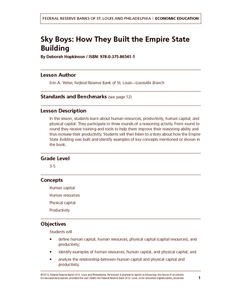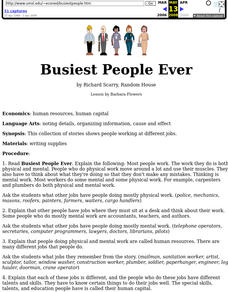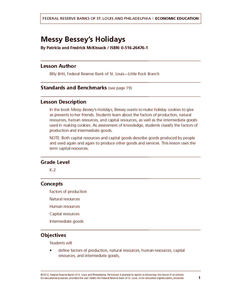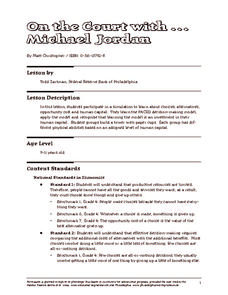Federal Reserve Bank
Ben Franklin: Highlighting the Printer
By studying Benjamin Franklin's work as a printer, your class will have a fantastic opportunity to learn about the economic concepts of entrepreneurship, human capital, and investment.
Federal Reserve Bank
Investing in Yourself: An Economic Approach to Education Decisions
What is the difference between physical capital and human capital, and in which should you invest? While considering the concept of return on investment, take a look at the payoffs and consequences of investing in training and education.
Federal Reserve Bank
Lesson 4: Back to School
Based on your current level of human capital, how long would it take you to earn $1,000,000? What about your potential human capital? Learners explore the importance of education and experience when entering the workforce, and compare...
Federal Reserve Bank
Journey to Jo’burg: A South African Story
How did South African apartheid affect the ability of people of color to increase their human capital? Here is a rich lesson in which learners come to understand the relationship between investment in human capital and income, while also...
Federal Reserve Bank
Sky Boys: How They Built the Empire State Building
How tall is the Empire State Building? Lead your class through a collaborative estimation activity to determine the number of quarters it would take to reach the top and teach the following concepts: human capital, human resources,...
Federal Reserve Bank
Invest in Yourself
What are the different ways that people can invest in their human capital for a better future? Pupils participate in an engaging hands-on activity and analyze data regarding unemployment, the ability to obtain an education, and median...
Federal Reserve Bank
Ten Mile Day
Get your class working on the railroad with this detailed and interactive lesson plan. After reading and discussing Ten Mile Day, learners explore division of labor, human capital, and productivity with a hands-on group activity in which...
Carolina K-12
Factors of Production and Economic Decision-Making
Class members begin this engaging economics activity by listing all the resources used in producing a car and using that example to draw parallels to the four primary factors of production: capital goods, labor, natural resources, and...
Federal Reserve Bank
What Are the ‘Ingredients’ for Economic Growth?
Delve into the concept of economic growth with your class members, including why economic growth is important, what causes it, and how can countries encourage it.
Curated OER
Lemonade For Sale
2-3rd graders listen to the story, Lemonade for Sale, by Stuart J. Murphy. In the story, children produce and sell lemonade to raise money for their clubhouse, create a product, classify the resources used in production as natural...
Curated OER
Earning an Income
Fourth graders study the role of money in society and define how to earn an income. In this human capital lesson, 4th graders read the book Shoeshine Girl and discuss it. Students discuss various economic concepts and complete the...
Curated OER
I Can Touch the Stars
Students examine the concept of human capital. In this human capital lesson, students research how Dr. Sally Ride and Senator John Glenn invested their human capital. They determine how these two increased their human capital through...
Curated OER
Three Little Pigs: Human, Natural and Capital Resources
First and second graders will learn about natural, capital , and human resources through the story The Three Little Pigs. They will listen to the story, write down what they know about straw, wood, and brick, then complete a chart...
Curated OER
Busiest People Ever
Students write a paragraph about what they want to do when they grow up. They include the special skills and education (human capital) they must have to do the job they've chosen.
Road to Grammar
Capital Punishment
Hold a brief discussion about the death penalty with your English language learners. The resource includes vocabulary words to examine, three different viewpoints for students to consider, and a list of discussion questions. The resource...
Winston-Salem Forsych County Schools
Economics Worksheet Economic Systems and Circular Flow
Agribusiness, human capital, productivity. Find out what your class members know about economic systems and terminology with this two-page economics worksheet that that asks kids to identify terms and concepts.
Curated OER
Is Capitalism Good for the Poor?
Young scholars have the unique opportunity to analyze actual data collected by field researchers They research to see whether holding clear title made a difference in farmers' willingness to invest in capital improvements that would...
College Board
2013 AP® Human Geography Free-Response Questions
How have railroads influenced urban growth? What are the consequences of population booms? What has led to the growth of tech centers like Silicon Valley? A series of short-answer questions from the College Board explores the dynamics in...
Federal Reserve Bank
Messy Bessey's Holidays
Teach your class some fairly complex terms—factors of production, human resources, capital resources, natural resources, and intermediate goods—with a storybook (Messy Bessey's Holidays), plenty of visuals and handouts, and related...
Center for Entrepreneurship and Economic Education
Popcorn Economics
Scarcity of resources is a fundamental economics concepts that kids need to understand. You'll use a large bag of popcorn to demonstrate this concept. Have the class come up row-by-row to fill their snack bags with popcorn. By the last...
Carolina K-12
Comparing Economic Systems
How do people make decisions in a world where wants are unlimited but resources are not? How do individuals and governments utilize scarce resources (human, natural, and capital) in different economic systems? Introduce your learners to...
Curated OER
Why do People Migrate?
Second graders examine the reasons for human migration. In this human migration lesson, 2nd graders make lists of reasons why people migrate. Students view pictures of people who have migrated and discuss why. Then the students watch a...
Curated OER
Death penalty debate
Students debate the motion, "the USA is right to have capital punishment." Students begin by researching and writing their arguments to support or oppose the motion. After the debate, students vote according to their beliefs.
Federal Reserve Bank
On the Court with... Michael Jordan
Pupils learn foundational economic concepts and consider the importance of decision-making, how to evaluate choices and alternatives, and the benefits of consistent training and practice by learning about the early life of Michael Jordan.
Other popular searches
- Human and Capital Resources
- Human Capital Investment
- Natural Human Capital
- Human Capital in Africa
- Managing Human Capital
- Investment in Human Capital
- Investment and Human Capital
- Economics Human Capital
- Physical and Human Capital
- Human, Capital, and Natural
- Human Capital and Natural

























